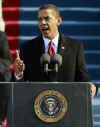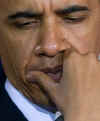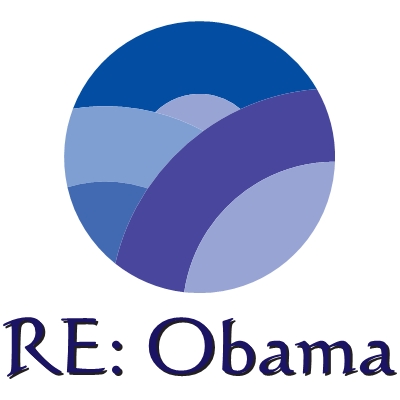St. Regis Hotel
Washington, D.C.
7:05 P.M. EST
THE PRESIDENT: Thank you so much, Rob, for the introduction. And it’s wonderful to see all of you. I’m going to be very brief at the top because I want to spend most of this time in a dialogue.
As Rob said, I see a lot of friends here, people who supported me since way back when before people could say my name. And as I look around the room, folks from all across the country, I am mindful of the fact that not only have you done so much to help me be in a position where I can make a difference in America, but separate and apart from my election, so many of you have supported good causes that are making a difference day in and day out. And so I just want to say thank you for that.
As Rob said, the last three years we’ve obviously gone through historic times, a set of historic challenges — the worst economic crisis and financial crisis since the Great Depression, two wars, a transformation of our geopolitics. And I couldn’t be prouder of the track record that we’ve been able to put together over the last three years — not only in preventing us from sliding into a Great Depression, not only shifting from a situation where we were losing 800,000 jobs per month to 22 consecutive months of job growth, the highest manufacturing job growth since the ’90s, the largest job growth, period, last year since 2005, passing historic health care legislation that we’re in the process now of implementing, tough Wall Street reform legislation that is going to make sure that we don’t see the same kind of reckless behavior that got us into this mess in the first place, along with a set of laws that are going to make sure that the values we care so deeply about are the law of the land –things like ending “don’t ask, don’t tell,” or making sure that people are actually getting equal pay for equal work, one of the strongest environmental records of any President in the modern era.
So, across the board, I couldn’t be prouder of what we’ve accomplished. On the other hand, what I’m also mindful of is how much remains to be done.
What led me to run in 2008 was a sense that there had been a fundamental shift in the social compact, a fundamental shift in the American promise — the notion that if you worked hard, if you met your responsibilities, that you could get ahead, support a family, send your kid to college, avoid being bankrupted by an illness, retire with dignity and respect. That basic bargain felt like it was slipping away from far too many Americans.
And so in addition to dealing with crises, our goal since before I came into office was how do we restore that sense that any American, no matter where they’re from, no matter what they look like, that they’ve got a shot to succeed; how do we restore an America where everybody gets a fair shot, everybody is doing their fair share, and we’re all playing by the same set of rules.
This past Tuesday, I tried to lay out that vision, that blueprint for how we move forward, involving resuscitating American manufacturing — the same way we’ve done with the auto industry, we can do that across the board. American energy — how do we, yes, make sure that American oil production and natural gas are properly produced, but how do we also make sure that we’re still investing in clean energy and looking 10, 20, 30 years down the road and making sure that we’re at the forefront of the kind of clean energy economy that I think everybody is going to have to adjust to.
How do we make sure that we’ve got a tax system that reflects everybody doing their fair share — because if we’re going to bring down our deficits and make investments in our infrastructure and our basic research, then we’re going to have to do it in a balanced way.
And how do we make sure that we’ve got a set of regulations in place that aren’t designed to squelch entrepreneurial activity and the free market but are designed to make sure that our consumers are protected and that our air is clean and our water is clean and that we don’t see another crisis like we saw in the housing market.
And those are going to be huge fights. And that’s why I think this year is going to be extraordinarily exciting. In some way, the spirit of this year’s race will be different because in 2008, obviously everybody was full of hope and possibility, and we had not yet gone through a crisis. And it’s worn on people and it’s been tough for folks. Now I think what we’re really struggling for is the kind of America that most of the people here believe in and I believe that most Americans believe in.
But we’re going to have to fight for it, because the other party has a fundamentally different vision about where to take this country. Their basic argument is, is that if we strip out regulations, if we disregard environmental concerns, if we take away protections for consumers, if we lower taxes even further for the kind of folks who are in this room, that somehow growth and the American Dream will be restored. And I fundamentally disagree with that vision. I think it’s the wrong vision for America.
But given the difficulties that Americans have gone through over the last three years, this is going to be a tough fight, and we’re all going to have to be focused on making sure that every single day the American people understand not only where we want to take the country but also that we’re willing to fight for them; that this is not an abstract ideological argument, but this is a practical, concrete argument about whether or not they’re going to be able to find a good job that pays a living wage, whether they’re going to have health care that protects their families, whether or not, as consumers, they’re going to be protected from being taken advantage of. They’ve got to feel that we are actively advocating on their behalf.
The last point I’d make is, is that — and I made this point at the State of the Union — as I travel around the world — and obviously we’ve been extraordinarily active, not only ending the war in Iraq, but managing a responsible transition in Afghanistan, helping to usher in an Arab Spring that is still uncertain in terms of its outcome — what’s striking to me is the degree to which for all of the challenges we’ve gone through over the last three years, the world still looks to us for leadership. They’re still looking to America because for all our power, they also understand we are invested in a set of international rules and international norms and a set of universal values that historically superpowers have not paid a lot of attention to.
And so when we went to Asia, for example, what was striking was, yes, people understand that China is on the rise and economically their fates are going to be tied not only to us but also to a rapidly growing China, but when it comes to putting together an architecture out there that assures that small countries are protected, that everybody is abiding by the same sets of rules, that their natural resources are properly developed and not exploited — they’re still looking to us.
And so part of the message I wanted to send last week at the State of the Union was we’ve been through tougher times before, we’ve been through bigger challenges before, and we’ve always come out stronger, more united, and have remained a beacon of hope around the world because — I think it was Churchill who said that the Americans always end up doing the right thing after they’ve tried every other alternative. (Laughter.) And that’s true. We muddle our way through because of messy democracy and it’s in our nature to be contentious and have these big arguments, but ultimately we choose the right path. And that’s what the world is counting on right now as well.
I think we’re going to get there. But — in fact, I know we’re going to get there, but I’m going to need all of your help to get there as well.
So thanks for the support in the past and I’m looking forward to you guys being in the foxhole with me this year. Thank you very much.



